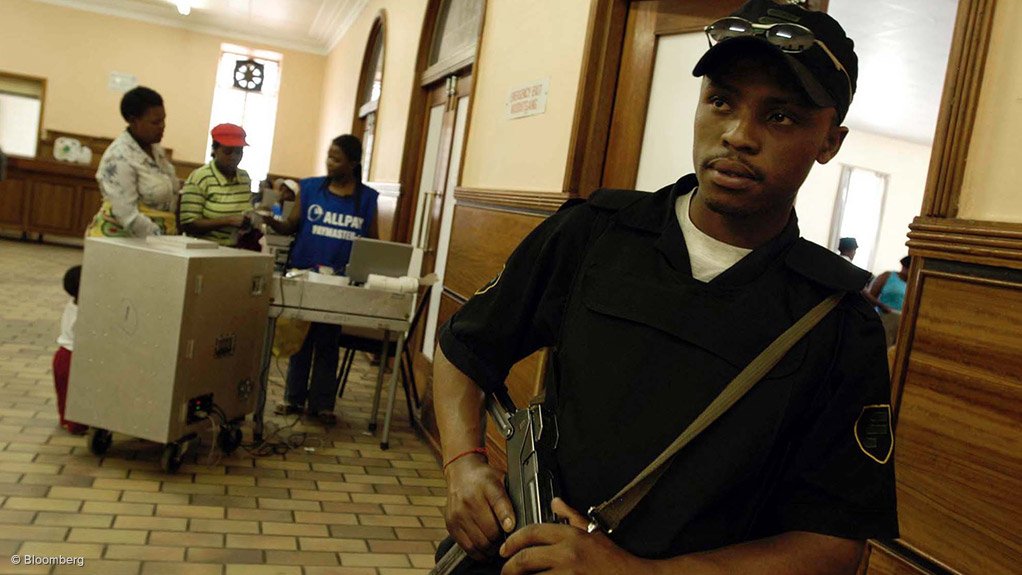An economic-impact assessment undertaken by the South African Chamber of Commerce and Industry (Sacci) has laid bare the alarming potential knock-on effects of proposed changes to legislation governing the foreign ownership of private security firms in South Africa, suggesting that the amendments could cripple the local R50-billion-a-year industry and cut 10%, or R133.4-billion, from the country’s gross domestic product (GDP).
While the Private Security Industry Regulation Amendment Act – currently awaiting sign-off by President Jacob Zuma – had been widely accepted by the private security industry as improving the regulation and functioning of the industry, fervent opposition had arisen in response to the eleventh-hour inclusion of a clause that stipulated at least 51% South African ownership of foreign-owned private security firms.
The addition had also extended the definition of security businesses to include companies such as Siemens, Panasonic, Bosch and Sony that “manufactured, imported, installed and distributed” security equipment, such as security cameras and access control systems.
The introduction of this indigenisation-style legislation would have particularly dramatic effects on the fast-growing private security industry which was, after government, the country’s largest provider of entry-level employment.
According to Sacci, the proposed legislation would also place South Africa in breach of critical international trade commitments to liberalise its services sectors in terms of the World Trade Organisation’s General Agreement on Trade in Services and would likely lead to the expulsion of the country from the benefits afforded by the Africa Growth and Opportunity Act with the US.
“The US has also recently suggested that, should the legislation be introduced, it would withdraw its support to South Africa in its application for loans from the World Bank and the International Monetary Fund, which could impact negatively on the country’s infrastructure programme,” private security industry body, the Security Industry Alliance (SIA) executive director Costa Diavastos told the media at a press briefing on Tuesday.
Further results of the assessment revealed R15.2-billion in lost income tax revenues, R12.7-billion in lost company tax revenues, R24.1-billion in lost indirect tax revenues and a R9.5-billion increase in public debt servicing costs.
The proposed amendments could, meanwhile, also see 683 000 formal sector jobs and 169 000 informal sector jobs being shed, economist Dr Roelof Botha cautioned on Tuesday.
“This legislation will generate bad publicity . . . and demonstrate a policy approach that suggests that we don’t mind being in breach of international trade agreements. This piece of legislation will also buck global trends towards globalisation.
“We are doing the opposite of what most international companies want to do, which is become more open. We are forgetting that we have case study on indigenisation on our doorstep in Zimbabwe, which ruined its economy and resulted in massive disinvestment. This is bad, bad legislation. It’s silly,” he remarked.
According to Diavastos, South Africa’s private security industry currently employed some 500 000 people and had seen the inflow of R4.5-billion of foreign capital over the last eight years, with companies traditionally reinvesting revenues into the growing local market.
However, the introduction of the proposed clause would likely see all major firms in the sector disinvesting from the country, he warned.
“It’s highly unlikely that they would operate in any territory in which they don’t have a controlling interest. They’re operators, not investors,” he asserted.
Botha added that it had been suggested that Police Minister Nkosinathi Nhleko had described the rationale behind the local ownership threshold as in the interests of “national security”; however, such claims had not been substantiated and had been dismissed by the Institute for Security Studies.
Diavastos, meanwhile, committed the SIA to continue working with the Ministry of Police to address the industry’s concerns and to find a workable solution.
“There are elements in government that are listening and we think that sense will prevail. There seems to be enough evidence that the President will send this back.
“We convinced them about 90% of the way and any legal action will be the last resort,” he concluded.
EMAIL THIS ARTICLE SAVE THIS ARTICLE
To subscribe email subscriptions@creamermedia.co.za or click here
To advertise email advertising@creamermedia.co.za or click here











